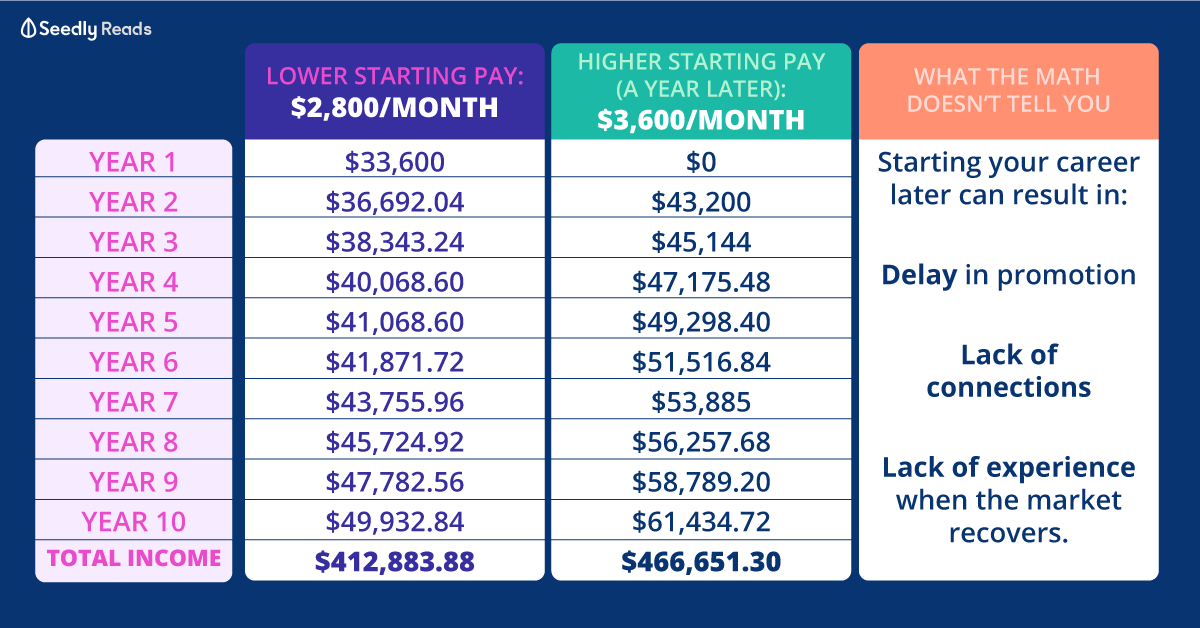Advertisement
Anonymous
Hi, I just started my first job and settled my insurance. But I am still struggling to manage how to allocate my salary.. I’ve heard of the 50-30-20 rule, but how do I know what works for me?
18
Discussion (18)
Learn how to style your text
Reply
Save
Silvester Leo
23 Oct 2020
Risk and Wealth Management at Self-Employed
Insurance is a tool that are used to transfer your risk to the insurance company.
You should never pay for more than what you need. The last thing you want is a policy lapse due to your inability to pay & an unexpected event occur.
Here's a rule of thumb that most insurance agents would not tell you. Let me summarize them into 4 risks that should be taken care of.
Risk 1: You lose your income because of your inability to function like a healthy person due to (ex. cancer, leukemia, etc. )
Your income should be replaced over a 10 year period. Monthly income x 12 mths x 10yrs (2 years for treatment, 5 years for rehabilitation, 3 years to undergo training & be relevant in the job market)
Industry standards always says 5 years. Do a reality check: if you have friends & relatives that ever experienced cancer, just take a look how many of them actually took 5 years to get back into the job market.
Risk 2: Unable to repay loans & Cover family expenses due to Early death
If you're planning to buy a non-hdb loan property with your future partner in time to come, I suggest you to take it into account the loan amount so that you can lock in your premium when you're still young.
(age of retirement-your current age) x 1.5 times your salary x 12 mths
These funds should help your family repay any of your existing liabilities, and also act as an income replacement for your family's day to day expenses until your "supposed retirement age" Pay raises increases your standard of living, and thus, 1.5x took that into consideration.
Risk 3: Huge medical expenses (surgery & rehab) that would cause a hole in ur family's pocket due to severe injuries caused by a car accident, etc.
One of the most straightforward risks to be taken care of.
Most policies will require you to Co-pay a small percentage of bill size. Do set aside emergency expenses for this.
Risk 4: Unable to perform in almost any job functions due to a disability caused by an accident. Your income replacement and cost of medical expenses go for as long as you live.
Therefore, in the event that this risk occur, your advisor should be experienced enough to invest ur funds (from ur permanent disability benefits) in an investment vehicle on ur behalf.
These funds needs to hedge against inflation (>3% p.a) and used as an income replacement tool for your lifetime.
This risk is the most complex to manage as it is being managed over a pro long period. I recommend you to get a consultant that is not just doing insurance, but has the ability to help you manage these investments. (preferably someone who has deep understanding in how economics correlate to different investment funds ex. UTs, ETFs, etc.)
TAKE NOTE there are many insurance agents that overcharge for early critical illness so that they could get fatter commissions. ONLY BUY WHAT U NEED.
*
Last tip: policies with cash value are never worth the buck. You would have made more investing in CPF than an insurance policy.
If you need any guidance, let me know.
Reply
Save
Teo Wei Keat
15 Sep 2020
Biomedical Sciences at La Trobe University
It's a general rule which means some might not fit into this rule. Still, there is no need to be concerned as all of us have different financial situation, liabilities, responsibilities and etc.
You can use it as a guide but don't get disheartened if you did not meet this rule.
Rather than focusing to fit into that rule, this is what I would do:
Get a budgeting app that is user friendly which shows you in the graphical format of expenditure like a pie chart (I am using Wallet by BudgetBakers which have both desktop and mobile platform)
Set aside an amount for categories like food
Diligently record every single transaction you made in the app. As long as the money goes out of your bank account or wallet, record it.
Review on a monthly basis of your expenditure.
It took me about 3 months to fully understand my expenditure pattern.
Once you know your spending pattern, it would be easier for you to plan as you have the numbers to work on.
Most expenses like insurance, telecom and subscription are pretty fixed unless you upgrade it.
Example of an expense that can vary is food as you know, celebration and gathering can make you spend quite a bit (but it's fine if it is once in a while)
At the same time, if you decide to engage in a financial planner, these numbers definitely make the planning a whole lot easier.
You should identify expenditure that can be reduced like food and shopping which is why you should set a monthly budget and stick with it. Most of the budgeting app including Wallet does allow you to set a budget and even prompt you if you are close to hitting the limit.
Reply
Save
It's not the percentage of salary you save but rather remaining committed to saving that absolute sum every month.
Reply
Save
That's a general rule for those that have no idea how or where to start. It's like a starter guide f...
Read 5 other comments with a Seedly account
You will also enjoy exclusive benefits and get access to members only features.
Sign up or login with an email here
Write your thoughts
Related Articles
Related Posts
Related Posts
Advertisement










The most important rule is the budget must balance, which is quite really saying don't spend more than you bring in. If you can come in a lot lower than what you earn, even better.
(the 50-30-20 rule is a guide, there are people out there who can save 50%, but I am not here to encourage FOMO)
Quick tips
Start with 3 months of spending / bank and card statements - and start grouping the transactions together. You first try to understand your own behaviour. Then you can try to go to full year budget.
The budget is just a plan. The first few years you will find you will miss somethings (eg medical bills / dental / vacation related spend / angpows you give for wedding / White gold for funerals). Don't sweat it out for small bumps, but if you find yourself very over or under budget, you should rethink how you want to plan it.
I recommend just framing six buckets for budgeting at most - the usual types will relate to house & loans / transportation / own spending / family related spending / insurance & taxes / retirement & savings. Focus on the large spend in your life (where 80% of your money goes).
There's no hard and fast rule to budget, and also don't recommend fixed allocation. Some people like big fancy House / cars / yachts so those categories will be high. Some people prioritise family and spend more there.
I only have two main rules for myself - the budget must balance, and try to cap insurance cost to not more than 15% of take home pay.
For fresh grads / those that just step out to work, I would advise you start giving family allowance or rent or pay some of the bills, plus pay down education loan or forced savings. Make the family allowance + education loan + forced savings about 30% of your take home pay... When you ready to settle down and start family, at least this 30% will slowly be the mortgage and family bills (not to mention help provide for the down-payment and wedding)